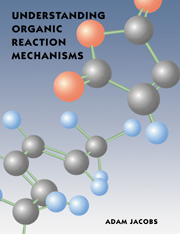Book contents
Summary
If a chemical reaction takes place, there is always a reason why. In this chapter, we will look at the thermodynamics and kinetics of reactions, which tell us why some reactions happen and some do not. We will see some of the general features that can make reactions favourable, and look at why some reactions may be favoured over others if there are alternative pathways.
Thermodynamics and kinetics compared
Free energy
It is pertinent to ask ‘why do reactions happen?’ The answer is that a chemical reaction will take place if it leads to a decrease in free energy. Free energy changes can be thought of as the thermodynamic driving forces behind all reactions. This is true not only of chemical reactions, of course. A decrease in energy is the driving force behind all physical processes. For example, apples fall out of trees because they move to a position of lower gravitational energy in this way.
The driving force for a reaction is a very important concept. No chemical reaction can happen without it. If we are not sure whether a reaction is feasible or not, one of the first things we should do is to look for a plausible driving force.
Free energy is made up of two components, enthalpy and entropy, which we will describe below.
- Type
- Chapter
- Information
- Understanding Organic Reaction Mechanisms , pp. 59 - 83Publisher: Cambridge University PressPrint publication year: 1997

